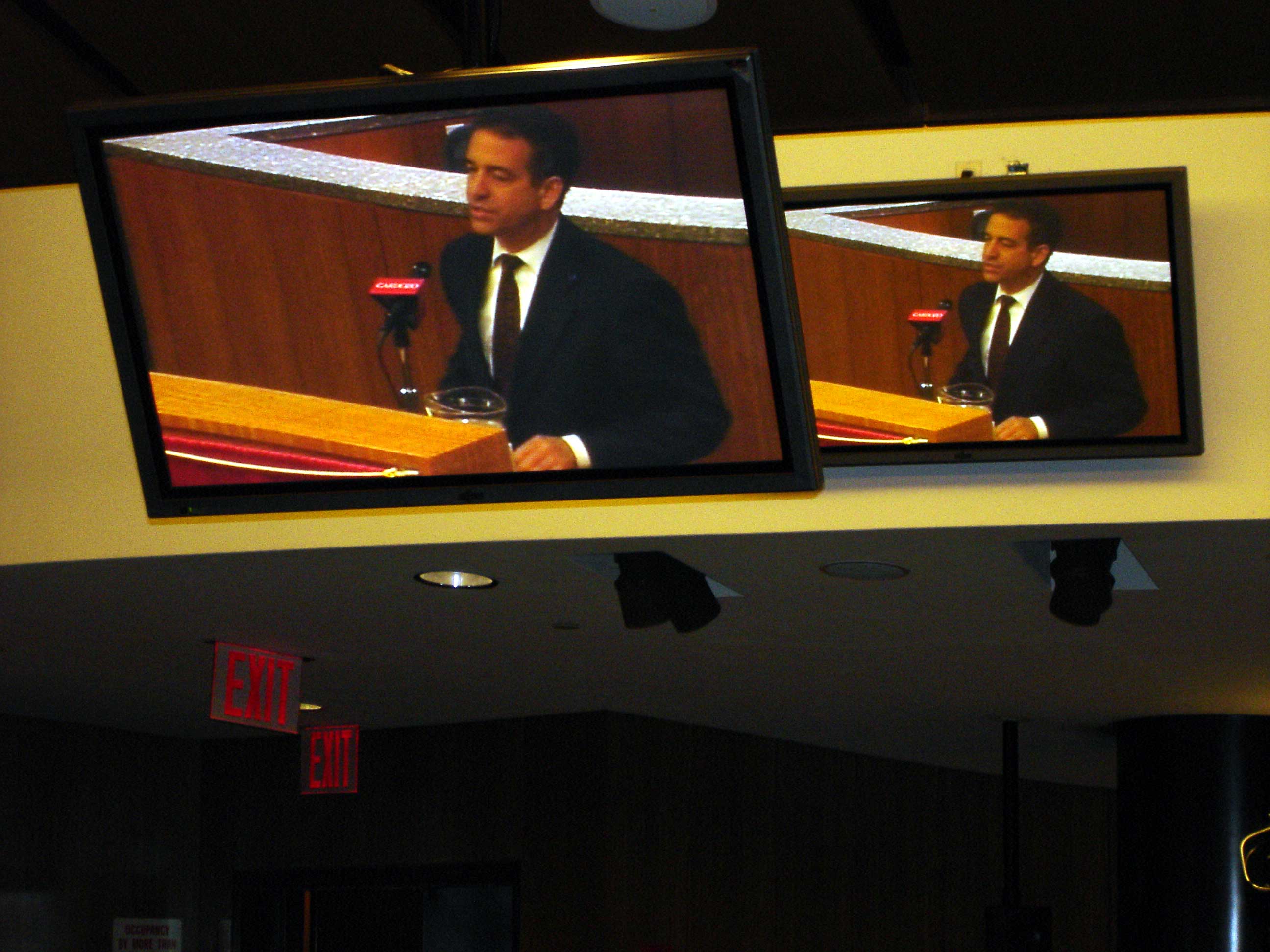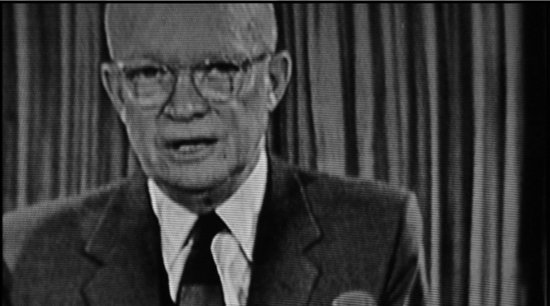“‘I can’t believe I’m in a conservative hall listening to him say [Bush] is off course trying to defend the United States,’ Sorcinelli fumed.” As a result of his questioning Dubya’s NSA powergrab, right-wing civil libertarian Bob Barr finds himself persona non grata at the annual Conservative Political Action Conference. Similarly in the doghouse with the powers-that-be is right-wing pollster Frank Luntz, due to a longstanding feud with John Boehner — Luntz backed the wrong horse in ’98. And, speaking of Boehner, the new Majority Leader is apparently causing mild tremors along another GOP faultline, the one between evangelicals and pro-business stooges. (Boehner numbers among the latter.) Could this all be the prelude to a ’06 crack-up of ’94 proportions?
Tag: War on Terror
Another Break in the Ranks?
As critics in both parties poke more holes in Dubya’s flimsy NSA defense, Republican congresswoman Heather Wilson of New Mexico, chairwoman of the House Subcommittee on Technical and Tactical Intelligence, calls for a “complete review” of Dubya’s wiretapping program.
The McCain Blame Game.
In a fit of misplaced pique, John McCain goes house on Barack Obama over his relatively innocuous decision to skip McCain’s proposed “bipartisan” task force on lobbying revisions (and, by extension, Obama’s point that the Ballad of Casino Jack is primarily a GOP scandal.) I’ve been generally sympathetic to McCain’s work for campaign finance and lobbying reform throughout his career, but, frankly, the outrage of this letter is way outta line. I just posted on this in the comments at National Journal, so I’ll just repost here:
“I’d be more impressed with McCain’s alleged commitment to bipartisan reform if (a) he could find Dems other than Joe Lieberman and Bill Nelson* — not exactly the Democratic mainstream — to back his “task force” play, (b) he didn’t consistently allow himself to be used as the “mythical maverick” smokescreen for GOP lobbying abuses, and (c) he displayed half as much righteous outrage when the Dubya administration eviscerated his anti-torture legislation, violated both the FISA Act and the National Security Act of 1947 with their illegal wiretaps, and generally stood in the way of serious campaign finance reform. Sure, McCain talks tough at Barack Obama, but everytime Dubya comes a-knockin’ at his door, he folds like an accordion, even despite the ugly incident in the South Carolina primary six years ago.
The Republican Party controls the White House, the Senate, the House of Representatives, and — arguably — the Supreme Court at this moment. Is it really McCain’s contention that Barack Obama, a freshman Senator in the minority party, is the one stopping real lobbying and campaign finance reform from happening? Please. If McCain wants real reform, he should be directing his wrath at the people in charge. Otherwise, he’s even more guilty of putting the partisan game above the public interest than is Obama.” Update: Obama answers.
Specter v. S.P.E.C.T.R.E.
The Specter hearings into the illegal NSA wiretaps begin, and, so far despite Specter’s tough talk on Sunday, they’ve been pretty much a sideshow. For one, as they did with Big Oil, the GOP ensured by a 10-8 party-line vote that Gonzales didn’t have to testify under oath. For another, Gonzales has been falling back on the ridiculous Article 2 defense and saying little of import as of yet. Still, at least Republicans like Specter and Lindsey Graham are joining Feingold and others in calling out the administration’s dubious rationale for the Imperial Presidency, so perhaps these hearings may be of some service yet. Update: As the NYT points out, we’ve been here before. Update 2: Dahlia Lithwick is not amused.
SOTU ’06.
A quick note on Tuesday’s State of the Union: I actually think Dubya has delivered some well-crafted speeches (1/23) in the past, even if I disagree with almost all of their content. This wasn’t one of them. Except for the “America is addicted to oil” line (which Jimmy Carter basically said over 25 years ago) and the “human-animal hybrid” goofiness (which, as Crooked Timber points out, might mean trouble for diabetics), there wasn’t a single memorable moment throughout, just more of the same “9/11” and “freedom, yeah” grandstanding. (And Kaine was no better — I like to think I’m more interested in politics than most people, and I was bored stiff after a minute or two. Nice fireplace, tho’.) If the White House was looking for this address to reverse their ailing fortunes, a la Clinton in ’98, my guess is that they failed. (Pharyngula link via Now This.)
Big Russ.
With a tip-off from the Progressive Patriots Fund, I had the opportunity yesterday to catch Sen. Russ Feingold speak on the Patriot Act and the NSA wiretapping scandal over at Cardozo Law School. (Their pics are a lot better than mine — I forgot to charge my batteries, and thus only got in 2 or 3 shots before my camera died on me.) And how was he? Well, all-in-all, he came off as a convincing candidate for the election ahead, as well as an impressive, informed, and personable fellow. To be honest, I found his remarks a bit lawyerly (then again, he’s a lawyer speaking before a law school, so that’s not really a fair criticism), but, taken in full, he seemed a committeed progressive and a refreshingly candid leader, the type of dynamic, independent thinker the Senate should be teeming with, if the system came anywhere close to working these days.
The gist of Sen. Feingold’s remarks was thus: Al Qaeda is the central threat facing America and has been since 9/11. Yet, instead of bringing the nation together to eliminate this terrorist organization, the Dubya White House has chosen time and time again to endanger our national security and compromise our most fundamental American values for their own ideological or power-hoarding purposes. (Iraq, Guantanamo, extraordinary rendition, secret gulags, you name it.) Along those lines and as we now all know, the Patriot Act, which only Feingold voted against in 2001, contains some terrible provisions therein, the most notorious example affecting Middle America being Section 215 (which gives law enforcement, among other things, the right to see what you’ve been reading.)
Yet, as per the norm, Dubya has refused to admit that it’s even possible that something might be wrong with the Patriot Act now that it’s up for renewal — only that it’s necessary to defeat the evildoers and that any microscopic change in the statute could rend the fabric of freedom irreparably. (Despite this now-somewhat hoary ploy, Feingold and others have succeeded in blocking a permanent blanket extension for now, as y’all know if you’ve been visiting here lately.) And, of course, Dubya has taken this same tack of obfuscation and fear-mongering to cover up his brazen wiretapping power-grab — which, according to Congress’s own research arm, broke at least two laws and counting.
Again, this story is not news to many Dems out there, but Feingold laid it out in clear, comprehensible, and systematic fashion. (The only “breaking news” made was the Senator announcing this letter to Gonzales, asking him why he, in effect, lied to the Judiciary Committee during his confirmation hearings about the NSA wiretaps.) And he had some good lines throughout — In reply to Rove’s ridiculous claim that Dems were “pre-9/11”, Feingold quipped that the GOP suffered from a “pre-1776” mentality these days. (He also retold the recent Patrick Henry exchange.) To be honest, I’d liked to have heard more in this vein — In terms of breaking down the legislative legerdemain and legal issues at hand, Feingold was superb. But I thought the speech needed more narrative sweep and rhetorical grandeur, more explanation of why this battle matters so much to the workings of the republic. He doesn’t have to turn into Robert Byrd overnight. Still, I thought the remarks could have benefited from more dramatic heft and historical resonance: Jefferson, Madison, Adams, Lincoln, Wilson…they’re all relevant here. (Then again, as I said above, I was an historian sitting in a room full of lawyers, so I was a tougher sell than most.)
Along those lines, if there was a problem with this presentation, it’s that the Senator, while clearly outraged, at times seemed much less livid about all this than many in the audience, who occasionally sounded ready to hoist the black flag. (In fact, many will no doubt be happy to hear that Feingold was asked twice “why Democrats are so lame.” As he noted (and as the blogosphere can attest this week), if a crowd in New York City is this irate with the party, the Dems might be in serious trouble nationwide in November. Still, he also emphasized that the Democrats could be more effective fighters if they actually controlled a house of Congress — You can’t hold hearings if you’re in the minority.
In terms of other questions, Feingold said he supports and will take part in the very late-developing (and now already defunct) Alito filbuster (Roll Call.) In fact, he thought the Dems made a crucial mistake in capitulating to the original “Gang of 14” compromise, arguing cogently that Dems have seen nothing for it and may well have had the votes to win Catkiller‘s game of nuclear chicken. Since Casino Jack and lobbying reform seemed too big a subject to address competently in the time allotted, I asked him a question about his thoughts on the NYT decision to spike the NSA story for a year, his general view of the mass media’s performance in serving as a check on these types of executive abuses, and (’cause it seemed apropos) his thoughts on the burgeoning blogosphere’s role in all this. He didn’t really go after the Times decision, and said that, in terms of the recent Patriot Act debate, he thought the press had actually done an ok job. Regarding blogs, he called the Internet “a miracle for populist politics,” which was a good enough soundbite that everyone in my row dutifully wrote it down at the same time.
And, of course, Sen. Feingold was asked — a couple of times — whether or not he was running for President in 2008. Naturally, he played it coy — After all, we still have just under two years before the Iowa caucus. But, for what it’s worth, I was impressed by him — He’s not a first-class emoter like Edwards or Clinton, of course. Instead, he comes across as a highly intelligent, capable, and nuanced thinker, a la Bradley, Kerry, or Gore on his better days. But unlike those three, he also seemed much more comfortable in his own skin, more naturally himself at the podium, and — most importantly — more content to play the maverick if his lefty principles dictate thus. (Although, as I said, I’d like to see him tone down the lawyer-ese and rev up more Wellstone-ish fire if he does make a White House run.) I suppose there’s a small, bordering-on-infinitesimal chance that Rodham Clinton, Biden, Warner, or someone else might drop all the “New Democrat” protective camouflage this time around and begin loudly and undefensively proclaiming progressive principles to the Heavens. But, until that unlikely event, my candidate in the 2008 Democratic primary is Senator Russ Feingold of Wisconsin. (Update: 1776 link via Medley.)
Fight Club.
“In the councils of government, we must guard against the acquisition of unwarranted influence, whether sought or unsought, by the military-industrial complex. The potential for the disastrous rise of misplaced power exists and will persist. We must never let the weight of this combination endanger our liberties or democratic processes.” That flaming liberal Dwight Eisenhower’s somber farewell address to the nation is the historical and thematic anchor for Eugene Jarecki’s documentary Why We Fight, a sobering disquisition on American militarism and foreign policy since 9/11. In essence, Why We Fight is the movie Fahrenheit 9/11 should have been. Like F911, this film preaches to the choir, but it also makes a more substantive critique of Dubya diplomacy and the 9/11-Iraq switcheroo, with much less of the grandstanding that marred Moore’s earlier documentary (and drove right-wing audiences berzerk.)
Sadly, the basic tale here is all-too-familiar by now. Ensconced in Dubya’s administration from the word go, the right-wing think-tank crowd (Wolfowitz, Perle, Kristol, etc.) used the tragedy of 9/11 as a pretext to enact all their neocon fantasies (spelled out in this 2000 Project for a New American Century report), beginning in Iraq. Taken into consideration with Cheney the Military-Contractor-in-Chief doling out fat deals to his Halliburton-KBR cronies from the Vice-President’s office, and members of Congress meekly signing off on every military funding bill that comes down the pike (partly because, as the film points out, weapons systems such as the B-1 or F-22 have a part built in every state), it seems uncomfortably clear that President Eisenhower’s grim vision has come to pass.
To help him rake this muck, Jarecki shrewdly gives face-time not only to learned critics of recent foreign-policy — CIA vet Chalmers Johnson, Gore Vidal (looking unwell) — but also to the neocons themselves. Richard Perle is here, saying (as always) insufferably self-serving things, and Bill Kristol glows like a kid in a candy store when he gets to talk up his role in fostering Dubya diplomacy. (Karen Kwiatkowski, a career military woman who watched the neocon coup unfold within the corridors of the Pentagon, also delivers some keen insights.) And, when discussing the corruption that festers in the heart of our Capitol, Jarecki brings out not only Charles Lewis of the Center for Public Integrity but that flickering mirage of independent-minded Republicanism, John McCain. (In fact, Jarecki encapsulates the frustrating problem with McCain in one small moment: Right after admitting to the camera that Cheney’s no-bid KBR deals “look bad”, the Senator happens to get a call from the Vice-President. In his speak-of-the-devil grimace of bemused worry, you can see him mentally falling into line behind the administration, as always.)
To be sure, Why We Fight has some problems. There’s a central tension in the film between the argument that Team Dubya is a corrupt administration of historical proportions and the notion that every president since Kennedy has been party to an increasingly corrupt system, and it’s never really resolved satisfactorily here. Jarecki wants you to think that this documentary is about the rise of the Imperial Presidency across five decades, but, some lip service to Tonkin notwithstanding, the argument here is grounded almost totally in the Age of Dubya. (I don’t think it’s a bad thing, necessarily, but it is the case.) And, sometimes the critique seems a little scattershot — Jarecki seems to fault the Pentagon both for KBR’s no-bid contracts and, when we see Lockheed and McDonnell-Douglas salesmen going head-to-head, for bidding on contracts. (Still, his larger point is valid — As Chalmers Johnson puts it, “When war becomes that profitable, you’re going to see more of it.“)
Also, the film loses focus at times and meanders along tangents — such as the remembrances of two Stealth Fighter pilots on the First Shot Fired in the Iraq war, or the glum story of an army recruit in Manhattan looking to turn his life around. This latter tale, along with the story of Wilton Sekzer, a retired Vietnam Vet and NYPD sergeant who lost his son on 9/11 and wants somebody to pay, are handled with more grace and less showmanship than similar vignettes in Michael Moore’s film, but they’re in the same ballpark. (As an aside, I was also somewhat irked by shots of NASA thrown in with the many images of missile tests and ordnance factories. Ok, both involve rockets, research, and billions of dollars, but space exploration and war are different enough goals that such a comparison merits more unpacking.)
Nevertheless, Why We Fight is well worth-seeing, and hopefully, this film will make it out to the multiplexes. If nothing else, it’ll do this country good to ponder anew both a president’s warning about the “disastrous rise of misplaced power,” and a vice-president’s assurance that we’ll be “greeted as liberators.”
“The Power-Madness of King George.”
 “This extremity of Bush’s position emerges most clearly in a 42-page document issued by the Department of Justice last week. As Andrew Cohen, a CBS legal analyst, wrote in an online commentary, ‘The first time you read the “White Paper,” you feel like it is describing a foreign country guided by an unfamiliar constitution.’ To develop this observation a bit further, the nation implied by the document would be an elective dictatorship, governed not by three counterpoised branches of government but by a secretive, possibly benign, awesomely powerful king.” As Dubya embarks on another weeklong campaign of fear and distortion (as per standard Rovian operating procedure), Slate‘s Jacob Weisberg gapes at the audacity of Bush’s brazenly unconstitutional ploy for power. “[I]n his white paper, Bush as much as declares: ‘I determine what my words mean and I alone determine what yours mean, too.’…Bush’s message to the courts, like his message to Congress, is: Make way, subjects.“
“This extremity of Bush’s position emerges most clearly in a 42-page document issued by the Department of Justice last week. As Andrew Cohen, a CBS legal analyst, wrote in an online commentary, ‘The first time you read the “White Paper,” you feel like it is describing a foreign country guided by an unfamiliar constitution.’ To develop this observation a bit further, the nation implied by the document would be an elective dictatorship, governed not by three counterpoised branches of government but by a secretive, possibly benign, awesomely powerful king.” As Dubya embarks on another weeklong campaign of fear and distortion (as per standard Rovian operating procedure), Slate‘s Jacob Weisberg gapes at the audacity of Bush’s brazenly unconstitutional ploy for power. “[I]n his white paper, Bush as much as declares: ‘I determine what my words mean and I alone determine what yours mean, too.’…Bush’s message to the courts, like his message to Congress, is: Make way, subjects.“
In related news, Senate opposition to the Patriot Act — All the Dems and only four measly Republicans — seems to be holding firm for now, meaning that the old, unrevised version will remain in effect for the time being. Of course, if King George actually possessed the powers he’s arrogantly allocated to himself of late, there would be no need for a Senate vote on the Patriot Act at all. Hopefully, Arlen Specter understands the danger in these breathtaking assertions of unconstitutional power by Dubya, and will make his forthcoming Senate Judiciary hearings count for something. After all, given this administration’s blatant power grab, it’s no longer hyperbole to say that our republic is at stake.
Uncle Sam, or Big Brother?
“Judge Alito’s record and his testimony have led me to conclude that his impulse to defer to the executive branch would make him a dangerous addition to the Supreme Court at a time when cases involving executive overreaching in the name of fighting terrorism are likely to be such an important part of the Court’s work.” Although the Senate Judiciary Dems (including Feingold) lined up against him, Sam Alito made it out of committee on a 10-8 party-line vote. Now, with his nomination before the full Senate, and with Nebraska Dem Ben Nelson joining the GOP majority, it seems, unfortunately, that the “worst nightmare of liberal democrats” will come to pass, and Alito will join the Roberts court. (For what it’s worth, Nelson wasn’t alone in his apostasy: Santorum challenger Bob Casey also came out for the judge.) Well, let’s hope Justice Alito takes a less forgiving look at executive encroachment than has Judge Alito. (Casey link via Medley.) Update: While the NYT says filibuster, Dems Robert Byrd and Tim Johnson back Alito. (Of course, if the NYT hadn’t sat on the NSA story for a year, perhaps we could have nipped Alito in the bud back in November 2004.)
Rove: Feel the Fear.
“The curtain got pulled aside, and there’s not even a wizard behind it…these people are incompetent.” As you probably heard, Karl Rove emerged from hiding to offer his blueprint for Republican resurgence in 2006. Yep, you guessed it: terror, terror, terror, 9/11, 9/11, 9/11, garnished with a smattering of tax cuts. But, to their credit, it sounds like Dems are relishing this coming fight, with Intelligence Committee Dem Jane Harman pushing back once more on the illegal wiretaps, and, in keeping with the recent trend of presidential also-rans finding their voice, John Kerry taking off the gloves on the Sunday shows. “Osama bin Laden is going to die of kidney failure before he’s killed by Karl Rove and his crowd.“







